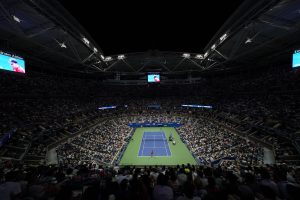After winning a record 10th title at the Swiss Indoor Championships in his home town of Basel, Roger Federer announced that he is withdrawing from the Paris Masters, so as to focus on the ATP Finals at the O2 in London next week. However, the bigger picture is that Federer is surely already focusing on 2020, which might just be his last season as a professional and will surely be his last and best opportunity to win a final Major before he retires.
Federer must have derived enormous satisfaction from his latest title triumph, and not only because it meant that he had won not one but two handfuls of titles at the tournament where he had first set foot on court as a ball-boy. In addition to all those warm and fuzzy sentimental feelings, his comprehensive straight-sets victories over Stefanos Tsitsipas and Alex de Minaur, two of the best young players on the tour (Tsitsipas has already qualified for the ATP Tour Finals and de Minaur will be at the Next Gen tournament in Milan) in the semi-final and final respectively must have been a welcome reminder to himself, as well as to his millions of fans, that he can still win important titles.
However, the question remains: can he still win a Major title? After two remarkable years in 2017 and 2018, during which he won two Australian Opens and a record-breaking eighth Wimbledon title, Federer did not win a Grand Slam tournament in 2019, although he of course came agonisingly close at Wimbledon, where he served for the title before Novak Djokovic broke back and took the match to a final-set tiebreaker, which the Serb eventually won.
In a sense, Federer’s achievement in Basel, however impressive it was, only compounded the sense of doubt about his future and in particular the doubts about his chances of winning another Major. Put simply, he remains good enough to beat “the rest” (the likes of Tsitsipas and de Minaur), but is he good enough to beat “the best”, namely the only two players ranked above him in the world, his twin nemeses of Novak Djokovic and Rafael Nadal?
The specific problem for Federer is that to win a Major he must win seven five-set matches and there is increasing evidence that he is not capable of doing so. A regular tour event like Basel only consists of three-set matches and so is nowhere near as physically demanding as a Grand Slam event. If, as is likely, Federer is now best placed to win best-of-three-set matches and events rather than best-of five, that would mark a remarkable turnaround from earlier in his career, where it was thought virtually impossible to beat him over five sets, especially on his favourite surface, the grass of Wimbledon. That was partly why it was so impressive, and surprising, that Andy Murray won the Olympic Singles Gold in 2012 by beating Federer in three straight sets at Wimbledon (where the Olympic tennis was played), when he had lost to the great Swiss in the Wimbledon Final proper just over a month before.
Federer, of course, will be 39 next August, just before the Tokyo Olympics. It has often been thought that Tokyo, or the US Open that follows it within a month, might be the place where he finally retires from tennis, especially if he wins the Singles Gold that remains the only significant piece of tennis silverware that he has never won.
It might seem absurd to anticipate the retirement of a man who is currently the third highest ranked male tennis player in the world, especially after he has just comprehensively defeated two top players in Tsitsipas and De Minaur who are barely half his age. And yet, as Federer himself has repeatedly said since he won the 2017 Australian Open (which was his first Major win since that victory over Murray at Wimbledon in 2012), he is increasingly focused, if not completely one-eyed in his focus, on the Majors. And since that amazing six-month run at the start of 2017, when he won both the Australian Open and the Wimbledon title and arguably played the best tennis that any male player has ever played, he has inevitably succumbed to both age and injury, most recently when he was afflicted by a back problem at the US Open in his five-set loss to Grigor Dimitrov.
The fact is that, as the rankings suggest, Federer could easily play on for several years yet. He has suffered remarkably few injuries during his tennis career and arguably no really bad one. As a result, he still seems to glide as effortlessly across a tennis court as he has ever done, in the process dispatching, with relative ease, most of his opponents most of the time.
However, the flip side of this scenario is that, with increasing age and susceptibility to injury, Federer is surely increasingly unlikely to challenge Djokovic and Nadal for the sport’s greatest prizes, namely the Grand Slam events. The prospect of him resisting injury and the general wearying effect of age, not to mention his two rivals, naturally becomes more remote with each passing year.
That is why 2020, which astonishingly will be Federer’s 23rd successive season as a tennis pro, may well be his last, whatever happens. If he is unable to win another Major, or the Olympics Singles Gold that seems to matter so much to him, then he may finally decide to call it a day. Equally, if he can win even one more Major, and his best chances are still at either the Australian Open or Wimbledon, then he might just decide to retire anyway, while he is still at the top and still, statistically at least, the greatest male tennis player ever.
Given Nadal and Djokovic’s proximity to his All-Time Major record of 20 (Nadal is now just one behind and Djokovic four behind), and the fact that they are both more than five years younger than the Swiss, it seems inevitable that before too long (and unless there is a sudden Major-winning breakthrough by one or more of the Next Gen group of much younger players) Federer will retire. For now at least, it seems that the best that he can hope for is not to remain the all-time “winningest” male player for much longer, but simply to retire while he is still out in the lead.






